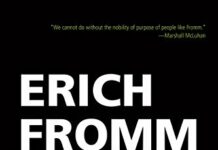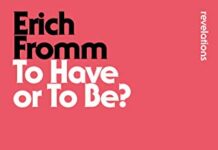
Ebook Info
- Published: 2013
- Number of pages: 179 pages
- Format: PDF
- File Size: 1.72 MB
- Authors: Erich Fromm
Description
The renowned psychoanalyst and New York Times–bestselling author of The Art of Loving unites philosophy from the East and West. In 1957, social philosopher and psychoanalyst Erich Fromm invited Daisetz T. Suzuki, the most famous Zen Buddhist master in the Western world, to a seminar at his new home in Cuernavaca, Mexico. Their discussion was one of the highlights of Fromm’s life, and the paper Fromm presented (and later expanded into a book) was a watershed work. Fromm demonstrates his mastery of the philosophy and practice of Zen, perfectly articulating how Zen tenets fit into the ideas of psychoanalysis. In this text, he creates new perspectives on both systems of thought. This ebook features an illustrated biography of Erich Fromm including rare images and never-before-seen documents from the author’s estate.
User’s Reviews
Reviews from Amazon users which were colected at the time this book was published on the website:
⭐Erich Fromm gave us so many great books. While this isn’t up there with The Sane Society, it is an important and valuable work that I can heartily recommend. You can’t beat the price either
⭐Suzuki, Fromm and De Martino connect Freud and Zen Buddhism, much in the way that Lester Levenson did.
⭐and soak it all in
⭐One of my favorite books. A brilliant and seminal study of the relationship between these twin paths to self-awareness. A must read for all thinking people. Here’s to world peace through individual happiness, as the Buddhisys say!
⭐good price quick service timeless wisdom
⭐love it
⭐Excellent read!
⭐Fromm took 3 of 11 papers from an August 1957 workshop in Mexico (expanding his own). Suzuki’s paper (76 pp.= 44% of book) was fascinating & profound. He explores differences between East & West exemplified in poetry, attitudes towards silence, etc. His observations were illustrative, but not entirely accurate due to great variations within East & West. His exposition seems to indicate that Japan is more INFP (introverted, intuitive, feeling, & perceptive in Myers-Briggs typology) whereas the West (as others have noted for the U.S.) is more ESTJ (extroverted, sensate=detail oriented, thinking, judgmental). But, this is not true for the French–his case is overstated. Interestingly, some of his examples parallel the West (depending on your definition of West). For example, he says, “Lao-Tse portrays himself as resembling an idiot.” The Sufis, however, do also-see Idries Shah’s book, “Wisdom of the Idiots.” Also, his spiral model matches that of modern Western mystics [also John Suler says “p. 217: “Wachtel (1977) suggested that the therapeutic process is a spiral.” & Lama Govinda in his Abidhamma book describes it as well]. He does, however, note Zen similarities to St. Augustine etc. Most importantly, his elucidation of the Unborn, Cosmic Unconscious, or `The true man of no rank’ is essentially a metaphysical extrapolation of Jung’s Self. Indeed, he is consistent quite with Jung-e.g. p. 25: `To know thyself’ is to know thy Self’ (of course, Jung wrote an introduction to a Suzuki book!). His description of Zen’s view of Self & God is refreshing & enlightening. Also, he says p. 9, `responsibility is logically related to freedom and in logic there is no freedom, for everything is controlled by rigid rules of syllogism. But he does seem anti-machine & perhaps anti-science. Science is not logic-limited as is philosophy, however. I think Suzuki would dislike Madhyamaka philosophy but not General Systems Theory. Some of this (1957) paper is dated–as Fromm points out, making unconscious material conscious does not necessarily cure a patient, & as Boucher, Tsomo, et al have shown, Zen masters moving West have succumbed to temptation. Nonetheless, Suzuki’s lengthy but valuable quotations from Rinzai were worth the cost of the book. Despite some dated material, I’d give the chapter 5 stars.Fromm’s chapter (65 pp. 38%) was an inconsistent mixture of dazzling insight & maddening oversight. His humanistic psychology would make more sense (& coincide more with Suzuki) if it included Jung’s collective unconscious rather than emphasizing repression. Though I agree that p. 91 “Well-being is possible only to the degree to which one has overcome one’s narcissism, to the degree to which one is open, responsive, sensitive, awake, empty (in the Zen sense),” he could use some knowledge of the Philosophy of Science & Knowledge Management-but he WAS writing in 1960. The 3 authors have little understanding of science (but this is common even today!): data is non-rational; science is not a function of Aristotelian logic; context is more important than information; only knowledge (not information) is meaningful…They criticize what they do not understand. Fromm seems to think that society drives consciousness (perhaps he’s an extrovert?) & falls into the trap of non-awareness/filtering he describes. Yet he quotes Suzuki p. 120 that Zen’s method `consists in putting one in a dilemma, out, of which one must contrive to escape not through logic indeed but through a mind of higher order’ in other words, a higher Level of Abstraction. I couldn’t agree more. He also agrees with Suzuki’s spiral model–p. 128 “return to innocence is possible only after one has lost one’s innocence.” Jack Engler stated “you have to be somebody before you can become nobody” in Molino’s “The Couch & the Tree.” But, Fromm absurdly states p. 133 “Like all terminological questions, it is not of great importance.” Languaging is at the heart of communications problems–translations of ancient works, understanding different cultures, et al. While he has a point that p. 134: “What Bucke describes as cosmic consciousness is, in my opinion, precisely the experience which is called satori in Zen Buddhism,” we cannot know how similar they are. We cannot know if, looking at the same blue object at the same time, two people have an identical experience of blue. How same is same? In modern Information Technology, two identical objects are called instances in order to differentiate them. They are identical, but also different. Scientists have address many things (usually from a practical perspective) unbeknownst to psychoanalysts, philosophers, or religionists,.De Martino’s short chapter (30 pp. 18%) begins with an interesting observation on what it is to be human–pp. 142-3 “The infant is not yet human; the idiot never quite human; the `wolf-child’ only quasi-human; the hopeless psychotic perhaps no longer human…ego consciousness which ordinarily 1st appears between the ages of 2 & 5 in a child born of human parents & reared in a human society.” Unfortunately, it quickly degenerates into a negative depiction of ego as subject/object (angst-ridden, melodramatic, & perhaps self-projective). He’s anti-transitive (with object); pro intransitive (no object), IMHO disagreeing with the spiral model. How would he react to Object-Oriented Programming (OOP) [my Knowledge Management and Information Technology (Know-IT Encyclopedia […] & modern Object-Relations Theory of psychology? He provides a romanticized, stereotypical & overly philosophical description of Zen IMHO–talking ABOUT rather than OF it–but states: p. 171 “This, in my limited understanding is the relation of Zen Buddhism to the human situation.” His point of view focuses on: p. 153 “The intrinsic existential plight of the ego” & concludes that p. 154 “It is not that the ego has a problem, but that the ego is the problem.” I think not. IMHO, the ego is a developmental abstraction in the throes of emergence, a new psychological paradigm in a chaotic (though temporary) state of adjustment–the psychological & metaphysical birth pangs of the Zen Unborn, the Dzogchen Ground of Being.
⭐This is really Erich Fromm’s book Psychoanalysis and Zen Buddhism and two other books, or at least another book and a long essay, the first book is by DT Suzuki, who introduced Zen Buddhism to the west and is referenced throughout Erich Fromm’s book itself, and a long essay The Human Situation and Zen Buddhism by Richard De Martino.I would be careful because Amazon appears to be conflating titles again, if you order a hard cover or paper back from the marketplace you may get the Fromm title which does not incorporate the other two works or the introduction to this one (also written by Fromm). Which is excellent (I also HIGHLY recommend the audible audiobook available on Amazon and iTunes which is very well narrated) but you want this edition, I would say it is better to read the Fromm title first and the DT Suzuki and Richard De Martino titles afterward but this just may be as it is the order in which I have read them.Some of the content in the Fromm book has been reproduced elsewhere, for instance “De-repression and Enlightenment” which appears in the Fromm Reader (Available on Kindle), the insights about unconscious, subconscious and awareness are reproduced in Art of Being. I would consider this in many ways to be the full developed, “mature” or most complete working out of Fromm’s psychological theories, the conscious, unconscious and social unconscious. I absolutely loved some of his insights about other major psychoanalysts (for Freud the unconscious is all man’s vices, for Jung the unconscious is all man’s wisdom) and the citations of Suzuki are good too. Unlike Alan Watts or other authors writing around the time this book was published (I think it was 1960) Fromm’s writings in this book definitely feel much more perennial feel or have aged much better. Quite apart from the discussion of Zen, this is (along with one other title, The Revision of Psychoanalysis) one of the best books on the topic of how psychoanalysis was formulated (at least up until the 1960s).DT Suzuki’s Lectures On Zen Buddhism, collected here, are actually better, in my opinion, than the Routledge Classics Suzuki book, Mysticism: Christian and Buddhist, or his An Introduction to Zen Buddhism. I do recommend those books, in fact read anything by Suzuki if you are interested in Zen, however, if you are interested in a more “psychological” reading of Zen (and also as it turns out a very good summary of the main ideas, ie the concept, the koan, the five steps) start here for definite.Of the three contributors Richard De Martino’s essay was the one I least enjoyed, it is still very much well worth a read, and he does make it clear he is hoping to provide a summary of Zen in an hour lecture as it pertains to depth psychology and psythotherapy (Mr De Martino must really have liked to set himself a challenge). It is the shorter of all three pieces and does repeat many of the best points made by the other contributors. I like Fromm’s essay better since it deals with Marx’s alientation theories, Spinoza’s Affective theories, some existentialist theories and Suzuki is deservedly thought of as THE authority on Zen. Although, as I have said, it is good to read another contributor on the topics already dealt with (and still relevant even to this day).Honestly, I could not recommend this book more and think it is absolutely essential reading for anyone interested in their own emotional health and mental wellbeing or that of others or even just the general readership.
⭐For me it was disappointing as, a few years ago, I was an avid reader of Erich Fromm and still am an avid follower of non-duality. I could not finiish it as I foulnd it incredubly ‘dry and uninteresting’ and this is in direct contrast to others by the same author such as ‘To Have or to Be’
⭐Das Buch schlägt auf eindrückliche Weise eine Brücke zwischen Östlicher Spiritualität und westlicher Wissenschaft. Auch wenn man nicht alle seine Ansichten teilt, so ist es doch interessant, welche Parallelen man zwischen der Psychoanalyse und Zen-Buddhismus finden kann. Sein Konzept von Bewusstsein und Unbewusstsein nicht als zwei real existierenden Entitäten, sondern als Maß für die Erkenntnis (awareness) waren für mich sehr interessant. Auch seine kurze Einführung in die Psychoanalyse war für mich als Laie nützlich.Insbesondere die Auseinandersetzung mit der Beziehung zwischen Bewusstem und Unbewussten enthielt sehr interessante Aspekte. So kann das Bewusste voller Illusionen sein während man unbewusst die Wahrheit sieht, sich eben nur nicht dessen bewusst ist. Bewusstsein ist keine Garantie für Wahrheit.Das alles auf ca. 66Seiten ist schon eine große Leistung.The summary as written on line prepared one for this book. No great surprises. Enjoyable to read if this is your taste in literature
⭐A bit too technical on Zen Buddhism at the beginning but that was the interesting part the psychoanalysis part was do boring I didn’t finish the book
Keywords
Free Download Psychoanalysis and Zen Buddhism in PDF format
Psychoanalysis and Zen Buddhism PDF Free Download
Download Psychoanalysis and Zen Buddhism 2013 PDF Free
Psychoanalysis and Zen Buddhism 2013 PDF Free Download
Download Psychoanalysis and Zen Buddhism PDF
Free Download Ebook Psychoanalysis and Zen Buddhism





